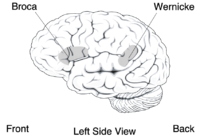
Photo from wikipedia
ABSTRACT Introduction Primary progressive aphasia (PPA) is a complex language-led dementia syndrome whereby disproportionate deterioration of speech and language occurs subsequent to neurodegenerative disease in the early to mid-stages of… Click to show full abstract
ABSTRACT Introduction Primary progressive aphasia (PPA) is a complex language-led dementia syndrome whereby disproportionate deterioration of speech and language occurs subsequent to neurodegenerative disease in the early to mid-stages of the condition. As no effective pharmacotherapies are currently available, speech and language therapies are the optimum treatment to maximize communication for as long as possible. Areas covered The authors present an overview of current speech-language therapy practices in PPA, highlighting recent research on effective treatments. Expert opinion The challenges in this complex field of practice are described. We highlight the challenge of improving access to speech-language therapy by advocating for increased referral rates. The authors also suggest effective incorporation of innovative technologies in treatment and an enhanced evidence base for the utility of lexical retrieval treatment in improving everyday communication as challenges for the future. Finally, increased provision of PPA-specific education and support for individuals and their families is required.
Journal Title: Expert Review of Neurotherapeutics
Year Published: 2021
Link to full text (if available)
Share on Social Media: Sign Up to like & get
recommendations!